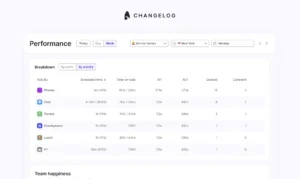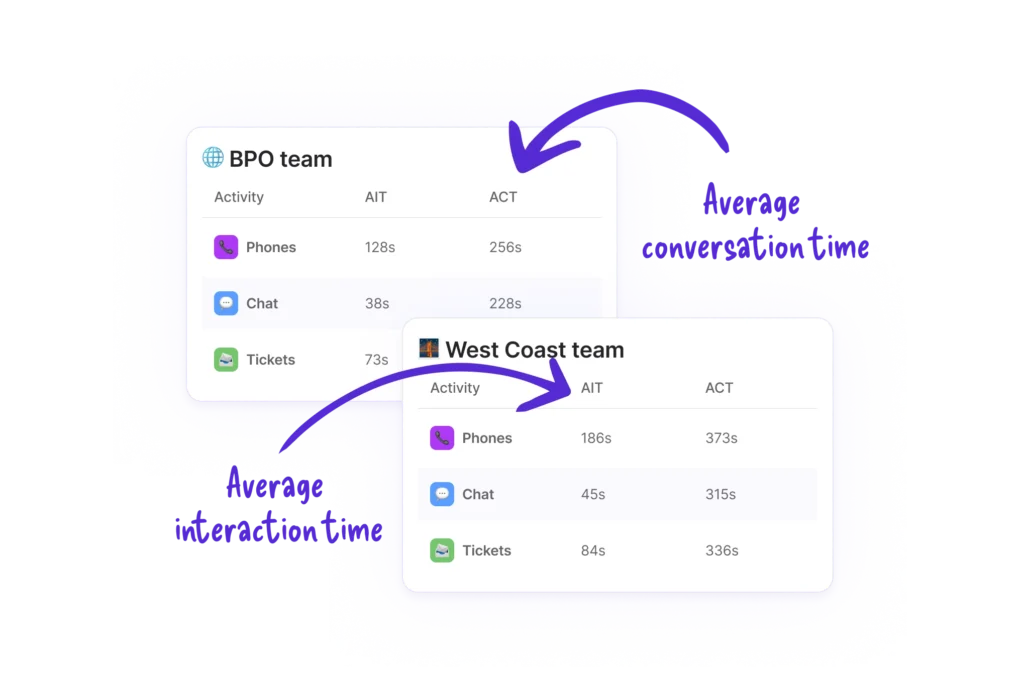
Redefining Average Handle Time (AHT) for omni-channel customer service

In the ever-evolving landscape of customer service, effective performance measurement is crucial to control costs while offering top quality support.
Surfboard is proud to introduce two innovative metrics designed to revolutionise how customer service teams evaluate and optimise their operations: Average Conversation Time (ACT) and Average Interaction Time (AIT).
The limitations of traditional metrics
Historically, the industry has relied heavily on Average Handle Time (AHT) as a key performance indicator. Traditionally, AHT measures the time from open to close, which while effective for live channels like phones, is very ineffective for planning asynchronous messaging channels due to it’s inclusion of waiting or idle time between messages.
While AHT has served its purpose, modern resource-conscious teams require a smarter way to measure the effort required to close tickets, enabling them to forecast and capacity plan in a more effective and accurate way.
Introducing ACT and AIT: A paradigm shift in performance measurement
So what are these new metrics?
- Average conversation time (ACT) measures the total amount of dedicated time an agent spent on the ticket, removing waiting or idle time.
- Average interaction time (AIT) measures the average time it takes for an agent to do each interaction. An interaction can be sending a response to a customer, or changing the status of a ticket.

Comprehensive interaction analysis
ACT and AIT offer a more nuanced and holistic view of customer interactions. ACT measures the time agents spent actively engaged with a customer, while AIT measures the average time agents spend on each interaction within conversations. This detailed approach provides deeper insights into the nature and quality of customer engagements.
Accurate forecasting and capacity planning
AHT is a core component of forecasting algorithms, such as Erlang-C, but traditional AHT metrics, which measure time from open to close, can produce wildly inaccurate staffing requirements as it assumes the agents time is solely dedicated to 1 conversation at a time.
In modern contact centres, agents will work on multiple open conversations at once, some of which can span hours or days. As a result, when forecasting for messaging channels, like email or chat, it’s more effective to forecast the effort needed for each interaction within the conversation.
AIT provides the granular data needed to evolve your capacity planning process, while ACT gives deeper insight into the overall effort needed over time.
Prioritising quality service
AI has taken it’s hold of customer support, and consumers know it. As a result, today’s customers expect personalised, comprehensive support when engaging with human agents.
Unlike AHT, which may inadvertently encourage rushed interactions, ACT and AIT are designed to value effective communication and thorough resolution. This shift in focus allows teams to prioritise delivering exceptional customer service without compromising on the depth and quality of each interaction.
Enhanced performance insights
These new metrics offer more granular data on team performance, highlighting areas of excellence and identifying opportunities for improvement.
Surfboard’s metrics are available per channel and per agent group, allowing you to easily track progress and compare cohorts.
This detailed understanding enables managers to identify skill gaps to enhance training programs, ultimately leading to more efficient and effective support teams.
Seamless integrations with your whole tech-stack
Surfboard automatically tracks agent behaviour and performance from team’s integrated customer service platforms and CRM. By combining data from multiple sources, managers can remain agile, reducing their reliance on custom spreadsheets or BI tools to swiftly adapt to fluctuating customer needs and contact volumes.
Surfboard’s intuitive and easy to read performance dashboard incorporates ACT and AIT alongside other critical metrics, facilitating data-driven decision-making in real-time.
Embracing the future of customer service analytics
The introduction of ACT and AIT represents a significant advancement in performance management for customer support teams. By shifting the focus from simple quantitative measures to more qualitative, context-aware metrics, Surfboard is empowering businesses to develop more customer-centric, and resource-efficient support strategies.
Surfboard remains committed to driving innovation in workforce management, and we look forward to sharing further advancements in the near future.
Book a call with our WFM experts
For a comprehensive analysis of how these new metrics can benefit your organisation, reach out to our team for more information or to schedule a demonstration.


